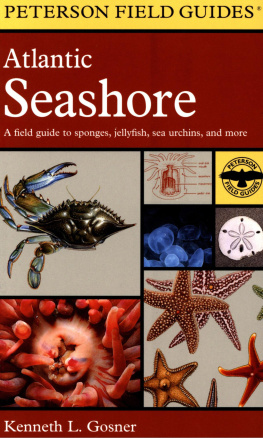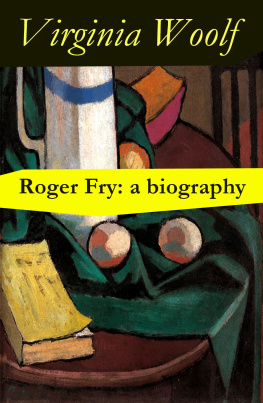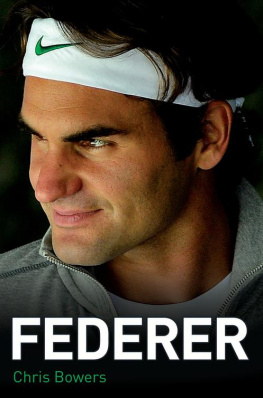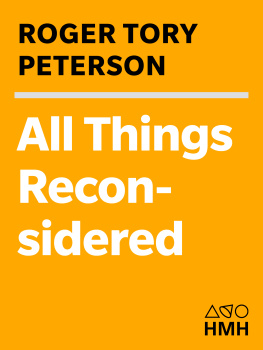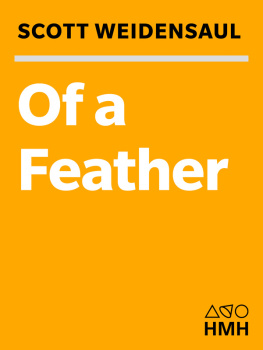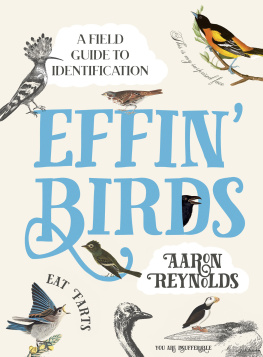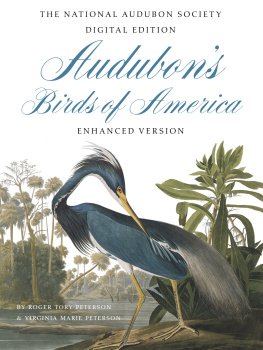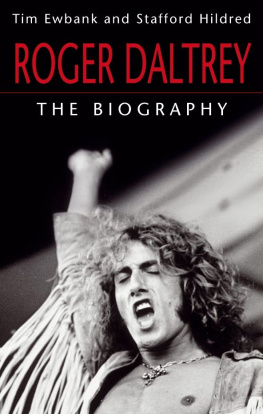Douglas Carlson - Roger Tory Peterson: A Biography
Here you can read online Douglas Carlson - Roger Tory Peterson: A Biography full text of the book (entire story) in english for free. Download pdf and epub, get meaning, cover and reviews about this ebook. year: 2007, publisher: University of Texas Press, genre: Detective and thriller. Description of the work, (preface) as well as reviews are available. Best literature library LitArk.com created for fans of good reading and offers a wide selection of genres:
Romance novel
Science fiction
Adventure
Detective
Science
History
Home and family
Prose
Art
Politics
Computer
Non-fiction
Religion
Business
Children
Humor
Choose a favorite category and find really read worthwhile books. Enjoy immersion in the world of imagination, feel the emotions of the characters or learn something new for yourself, make an fascinating discovery.

- Book:Roger Tory Peterson: A Biography
- Author:
- Publisher:University of Texas Press
- Genre:
- Year:2007
- Rating:4 / 5
- Favourites:Add to favourites
- Your mark:
- 80
- 1
- 2
- 3
- 4
- 5
Roger Tory Peterson: A Biography: summary, description and annotation
We offer to read an annotation, description, summary or preface (depends on what the author of the book "Roger Tory Peterson: A Biography" wrote himself). If you haven't found the necessary information about the book — write in the comments, we will try to find it.
The first authoritative biography of one of the 20th centurys foremost ornithologists, whose 1934 Field Guide to the Birds was one of the two foundational books that launched the environmental movement.
Roger Tory Peterson: A Biography — read online for free the complete book (whole text) full work
Below is the text of the book, divided by pages. System saving the place of the last page read, allows you to conveniently read the book "Roger Tory Peterson: A Biography" online for free, without having to search again every time where you left off. Put a bookmark, and you can go to the page where you finished reading at any time.
Font size:
Interval:
Bookmark:
Roger Tory Peterson
Mildred Wyatt-Wold Series in Ornithology
A BIOGRAPHY
by Douglas Carlson

A portion of chapter 11 appeared in the June/July 2005 issue of Birding.
Copyright 2007 by the University of Texas Press
All rights reserved
Printed in the United States of America
First edition, 2007
Requests for permission to reproduce material
from this work should be sent to:
Permissions
University of Texas Press
P.O. Box 7819 Austin, TX 78713-7819
www.utexas.edu/utpress/about/bpermission.html
LIBRARY OF CONGRESS CATALOGING-IN-PUBLICATION DATA
ISBN 978-0-292-79477-1 (library e-book); ISBN 978-0-292-75285-6 (individual e-book)
Carlson, Douglas, 1943
Roger Tory Peterson : a biography / by Douglas Carlson. 1st ed.
p. cm. (Mildred Wyatt-Wold series in ornithology)
Includes bibliographical references and index.
ISBN 978-0-292-71680-3 (cl. : alk. paper)
1. Peterson, Roger Tory, 19081996.
2. Ornithologists
United StatesBiography.
I. Title
QL31.P45C37 2007
598.092dc22
[B]
2007017838
To the memory of my parents, who took me outdoors
and helped me to watch, listen, and learn
19081926
Jamestown, New York
19261934
New York City and Boston
1934
The Field Guide, First Edition
19341942
New York City
19421953
Washington, D.C.
19541974
Old Lyme, Connecticut
19741980
Old Lyme
19801996
Old Lyme
Birds have occupied my daily thoughts, filled my dreams, dominated my reading. With these words from a speech delivered in Houston two years before his death in 1996, Roger Tory Peterson summed up a life given over to an obsession. Although friends and colleagues tell of a man who was generous, funny, and kind, Peterson did, indeed, live in a world apart. All of the people interviewed for this project would link Petersons monumental accomplishments to his focus. He was a complex man, plagued with self-doubt, but somehow excelling in the often-conflicting cultures of artist and naturalist. Yet his letters reveal his own brand of humility; in spite of honors and accolades, he always deferred to birds.
In the thousands of letters in the Peterson correspondence housed in the Roger Tory Peterson Institute of Natural History, personal references are uncommon, and when they do occur, they usually appear within the context of his work. When he began work on his autobiography, which was never completed, he planned to avoid the details of his personal life and focus, rather, on his life with birds: writing about bird people, bird adventures, bird population shifts, changes in the bird-watching world. His work was his life.
His outlook, however, was not so narrow as might be expected. By temperament he was a world citizen, interested in cultural as well as natural history. What he called the environmental ethic, which he expanded to include the humane ethic, provided the link. As he explained in the Houston speech, Watching birds has sharpened my senses, made my hearing more acute than most, my eyes more perceptive, my reactions quicker. This awareness radiated far beyond the birds, embracing nearly everything that is alive, from my fellow humans to the least beetle or cricket. It engendered a reverence for life.
Nevertheless, a subjects reticence to talk about private things makes a biographers task more difficult. And this reticence is compounded by the nature of Petersons prolific writing career. As his younger son, Lee, points out, Peterson was a great assimilator of ideas and a lover of phrases that encapsulated these ideas. For example, after his friend James Fisher coined the phrase birds are the litmus paper of the environment, it appeared in countless Peterson articles and speeches. And because of the focus of his life, he wrote on a narrow range of topics. Thus, at the very essence of his published work, despite its excellence there is a sameness. Stories and catchphrases reappear regularly over the decades. The same can be said of his correspondence.
Fortunately for those of us interested in a deeper understanding of the personal Peterson, he was a man of passions, given to powerful statements when moved. And as a man given to moodiness, he was often moved. Therefore it may be assumed that his personality was, in some ways, rather transparent. Readers are welcomed to share in this assumption, and to share in the intriguing process of analysis. Personality, however, must be secondary here.
While this book employs the obvious organizational devices of time and place, each section examines the varied facets of Petersons remarkable career: as painter, writer, teacher, and environmentalist. Taking a cue from Petersons autobiography plans, the emphasis here is on a body of work that spanned nearly the entire twentieth century. Because his death is so recent, there are many who have a personal investment in his story; beyond a request for an interview, no attempts have been made to invade the privacy of any of them. Through Petersons painting and writing, and in the work of the Roger Tory Peterson Institute, the truths of his life are revealed.
In expressing gratitude here, my first acknowledgment is to the humbling doctrine of dependent origination. Any event is merely the brief coming together of all its causes, the interconnectedness of countless events and people. A list of persons who made it possible for me to write this book will always be incomplete. Writing mentors from years past, colleagues, friends and family, editors past and present, and spiritual guides have read chapters, offered encouragement, and shared their wisdom. My heartfelt thanks to each of you.
The following people have supplied information about Roger Tory Peterson. Sincere thanks to all for your time and generosity: Peter Alden, Mark Baldwin, Robert Bateman, Paul Benke, James Berry, Mary Beacom Bowers, William Burt, Mary Dowdell, Victor Emanuel, Thomas Erlandson, Judith Feith, Harry Foster, Liz Gentile, Robert Hernandez, Don Hudson, Greg Lasley, Richard Lewin, Robert Lewin, Elaine Lillis, Jeremy Linden, Michael Male, Helen Moe, Marlene Mudge, Lee A. Peterson, Tory C. Peterson, Noble Proctor, Robert Sundell, William Thompson III, and Rick Wright.
Thanks also to the research staff of the Carl B. Ylvisaker Library of Concordia College, Moorhead, Minnesota; to the staff of the Roger Tory Peterson Institute of Natural History in Jamestown, New York; to the McKnight Foundation, the Lake Agassiz Arts Council, and the Jerome Foundation; and to William Bishel of the University of Texas Press and copy editor Rosemary Wetherold.
Special thanks to Jim Berry and Barbara Coulter Peterson.
Very special thanks to S.A., R.J., and T.W.T.
Jamestown, New York
In a lifetime, it is a fortunate person who has one good idea. Roger Tory Peterson had one. It grew into A Field Guide to the Birds, which was published in 1934 and became one of the most important and influential books about the natural world written in the twentieth century.
When Peterson died in 1996, tributes focused on the three ways that his Field Guide had led a large segment of American society into the green movement of the centurys last decades. David Clapp, a director of sanctuaries for the Massachusetts Audubon Society, suggested, Those field guides opened a door and, culturally, all of America has walked through it. By becoming aware of birds, we essentially opened up all of our environmental thinking. Clapp was referring to an awareness that there were more types of birds than just crows, robins, and little brown ones. The guide encouraged a closer look by rewarding it.
Next pageFont size:
Interval:
Bookmark:
Similar books «Roger Tory Peterson: A Biography»
Look at similar books to Roger Tory Peterson: A Biography. We have selected literature similar in name and meaning in the hope of providing readers with more options to find new, interesting, not yet read works.
Discussion, reviews of the book Roger Tory Peterson: A Biography and just readers' own opinions. Leave your comments, write what you think about the work, its meaning or the main characters. Specify what exactly you liked and what you didn't like, and why you think so.

